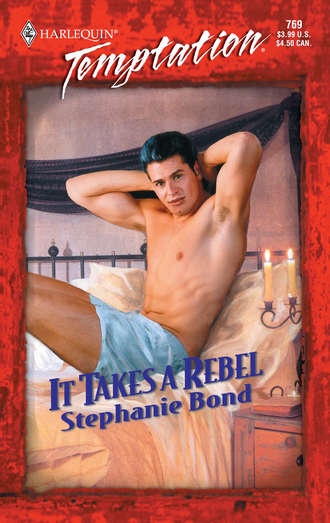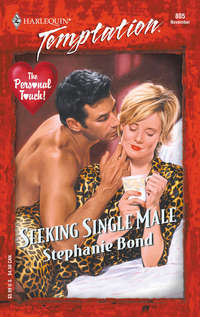
Полная версия
It Takes a Rebel
“Daughter.”
Jack stopped. “You know her?”
The woman ran a finger along the desk, then blew a quarter-inch of accumulated dust into the air. “I know of her. My son works in menswear at their store on Webster Avenue. Says that Tremont miss is a real go-getter.”
“More like a real ball buster,” he muttered to himself.
“Uh-huh, and not too bad to look at, if I recall.”
“A little too skinny, if you ask me.”
“And single, I think my boy said.”
“No wonder—she’s as cold as a freaking statue.”
Her eyes didn’t miss a thing, bouncing from an unturned calendar to a lopsided lamp shade to the silent computer. “Uh-huh. She’s rich, too, I’ll bet, and re-f-i-i-i-ned, with a royal shine.”
He smirked, remembering that on top of everything else, Princess Tremont had caught him ogling a naughty magazine. “Well, she wasn’t that impressive.”
She glanced at his bare feet and lifted a long yellow nail. “As opposed to you?”
Jack frowned. “I don’t make a habit of trying to impress people.”
The woman crossed her arms over her matronly bosom. “You married?”
“No.”
“Now there’s a surprise.”
“But my brother is,” he added, as if Derek’s goodness could atone for his own sins. “In fact, he’s away on his honeymoon.”
She sniffed. “When’s he due back, your brother?”
“In another two weeks.” Jack rubbed his temples as he picked up his earlier train of thought. “And Derek will kill me when he hears I’ve bungled this opportunity with Tremont.”
The woman leaned over and walked her fingers through the mail pile, then harrumphed. “First, he’d have to find you in all this mess. Where’s your office manager?”
“We don’t have one.”
“I’ll take it,” she said matter-of-factly, plucking her paper hat from her head and dropping it into the trash can.
Jack blinked. “Take what?”
“The job,” she said, her voice indignant. “You get back to whatever it was you were fixing—I hope it was the sign on the door—and I’ll get things organized in here.”
“But there isn’t a position—” The phone rang, cutting him off.
The woman yanked it up. “Stillman and Sons, how can I help you?”
She had spunk, he conceded. And a decent telephone voice.
“The overdue invoice for Lamberly Printing?”
She glanced at him, and he shook his head in a definite “no.” The company simply didn’t have the money.
“A check will be cut this afternoon,” she sang.
Incredulous, Jack could only stare when she hung up the phone. Then he spat out, “We can’t afford to pay that invoice!”
“I said a check will be cut, I didn’t say for how much.”
Jack pursed his mouth—not bad.
She picked up the greasy bag of food and shoved it into his hand. “Looks like you’re having a working lunch.” Dismissing him, she turned back to the mound of mail and began to toss junk letters into the trash.
He gaped. “Wait a minute. Who the devil are you?”
Without glancing up, she said, “Tuesday Humphrey, your new office manager.”
He wondered if the woman was unstable, but her eyes were intelligent, and her hands efficient. Exasperated, Jack lifted his arms. “But we’re not hiring an office manager!”
“I know,” she said calmly. “Because the position has been filled.”
The phone rang again, and she snapped it up. “Stillman and Sons, how can I help you?” Her voice smiled. “Mr. Stillman is in a client meeting, but just a moment, and I’ll check.” She covered the mouthpiece. “Alexandria Tremont’s secretary confirming your appointment at the Tremont headquarters at ten in the morning.”
Jack squinted. “But she just canceled the appointment.”
Tuesday uncovered the mouthpiece. “It was Mr. Stillman’s understanding that the appointment was canceled. No? Hold, please, while I see if his schedule will still allow him to attend.”
She covered the phone. “It’s back on—are you in?”
He nodded, his shoulders sagging in relief.
Tuesday uncovered the mouthpiece. “Yes, ma’am, please tell Ms. Tremont that Mr. Stillman is looking forward to a productive meeting. Thank you for calling.” She hung up the phone and returned to her sorting task. “Guess you still have a chance to impress the Tremonts.”
“Guess so,” he said, his mind racing.
“Well, get moving.” She snapped her fingers twice. “We both have a heap of work to do.”
Jack hesitated. “An IRS agent is supposed to come by.”
“You already told me, remember?” She flung a water sports equipment catalogue into the trash.
His hand shot out in a futile attempt to retrieve the catalogue—he could use a new water ski vest. But at the challenging expression on Tuesday’s face, he emitted a resigned sigh. The crazy woman couldn’t do more damage to their business or reputation than he had. They had no money to steal, no trade secrets to pilfer, no client list to filch. And at least he wouldn’t have to answer the damn phone. “Knock yourself out,” he said, splaying his hands. “But I can’t pay you.”
He stepped into the hall and closed the front door behind him to tackle the lopsided sign first. Within a few moments he’d rehung the smooth plaque of walnut upon which their father had painstakingly lettered and gilded the words “Stillman & Sons Advertising Agency” nearly twenty-five years ago. Without warning, grief billowed in his chest as his father’s easy grin rose in his mind.
At his wife’s encouragement, Paul Stillman had abandoned his modest home studio to become an entrepreneur when the boys were pre-teens. Jack had viewed the move as an act of treason against his father’s natural calling. He’d admired his father’s independence, his ability to adequately, if not luxuriously, provide for the family with the lively paintings he sold to local designers and businesses. He hadn’t wanted to see his father saddled with overhead and commuting and sixty-hour work weeks, but his father said the earning potential was better, and he owed their mother a retirement fund.
Indeed, his father had set aside a nice nest egg doing graphic artwork and ad plans for small-to medium-size businesses in Lexington, and later, mail order catalogs. Stillman & Sons had been a true family business—their mother ran the office, Derek had cut his accounting teeth on the books. Even Jack had pitched in on occasion, brainstorming with his father on the more creative projects, although the business itself had held—and still held—an unpleasant association for him. He banged down the hammer, connecting with his thumb instead of the nail head, then cursed and sucked away some of the pain.
He’d watched the stress of the agency take its toll on his otherwise carefree father. His hair had seemed to gray overnight, and worry lines had plowed deep into his forehead. His paintbrush and easel had languished, and little by little, Paul Stillman’s zest for root beer and whistling and people-watching had drained away.
Oh, his father had remained easygoing enough, but his good cheer seemed forced, and he’d stopped visiting the local art galleries, once a favorite getaway for him and his younger, more creative son. Jack missed those outings and he blamed the family business for taking his father away from him. At thirty-four, he recognized those feelings as childish, but he stubbornly clung to them nonetheless. From his perspective, responsibility sucked the life out of a man and left him with less to offer the very people he was trying to provide for.
Jack pulled a bandanna handkerchief from his back pocket and slowly wiped dust from the plaque. Frowning wryly, he scrubbed especially hard on the ending s in “Sons,” half hoping the letter would disappear. If truth be known, Derek was the son who deserved the agency—Jack wasn’t sure why his brother vehemently insisted he remain a partner.
Predictably, Derek had joined the agency full time when he graduated college, and the family expected nothing less of Jack. Instead, two years later he’d skipped his own graduation ceremony and hitchhiked to New Orleans where he’d put his two degrees—art and international business—to use by becoming the premiere artisan in Blue Willie’s infamous tattoo parlor just off Bourbon Street. By some stroke of divine luck, Jack had decided to return to Kentucky two years ago only weeks before a heart attack had claimed his father.
And except for a few “sabbaticals” here and there, he’d remained in Kentucky to help Derek run the agency, which had lapsed into a slow decline after their father had died. Their mother had turned to traveling with her sister, and Derek…well, Derek had turned into a tyrant—although, Jack conceded, he himself hadn’t been the model business partner. An unpleasant feeling ballooned in his chest, but he’d always refused to waste time on useless emotions like guilt, remorse, love, or hate. Funny, but all kinds of strange sensations seemed to be rolling around in his empty stomach this morning. It was as if Alexandria Tremont had set the tone for the day. Jack kneaded the tight spot just below his breastbone. The sooner he ate that sandwich, the better.
Swinging open the door, he was startled by a cheerful humming sound. He’d nearly forgotten about the self-proclaimed new office manager. Poor lady—she was probably bored and neglected by her son, looking for some way to kill time. Wonder what Derek would say?
Oh, what the hell, Derek had left him in charge, hadn’t he?
To her credit, Tuesday had performed small miracles in the few minutes he’d been in the hallway—the mail lay in three neat piles, and the desk and bookshelves fairly gleamed. She had found a radio and tuned in a local light-rock station, which provided the background for her spirited humming.
“Two phone messages,” she said, handing him pink slips of paper. “Bill collectors, both of them. I told them our accounting staff was preparing for an audit, and bought you a few days.”
Jack grinned. “Great.”
“Just a few days,” she warned, as she moved around the room, cleaning with what he recognized as his favorite tie-dyed T-shirt, which he’d been looking for. She stopped long enough to shake her finger at him. “So you’d better not blow that meeting tomorrow, young man.”
Properly chastised by a virtual stranger, he lifted his hands and escaped into the back office to finish the bookshelf. He tested the unit’s sturdiness and methodically replaced the books, but his mind wasn’t on the task at hand.
Jack simply couldn’t shake the memory of Alexandria Tremont standing there appraising him with her cool, disapproving eyes, her nose conveniently tweaked upward by nature to spare her the trouble of having to lift it when she spoke. He’d seen that look before, the sneer that branded him a loser by people who didn’t know that he could have been a hotshot executive had he simply chosen to be. At the meeting tomorrow he’d just have to show the uppity woman that he could hold his own among her kind.
Then he was angry at himself for wanting to impress anyone, much less Alexandria Tremont. He smoothed his ruffled pride by reasoning he was doing it for Derek and for the good of the agency, but anger fueled his energy. By the time he’d returned the books to the shelves and replaced the two lightbulbs, Jack felt that strange prickly feeling again, that alien sensation.
Apprehension? Jack inhaled deeply, but the tightness in his chest didn’t diminish. Could be. Derek had certainly complained enough about being apprehensive over one thing or another—perhaps this roiling nausea was why his brother kept a bottle of Pepto-Bismol in his desk and in the glove compartment of his ultraconservative car.
Jack stooped to retrieve a can of beer from his desk drawer, but froze when he heard raised voices from the front office. The IRS agent? He slipped into his shoes, removed the tool belt, and jogged to the front, but his feet faltered when he saw that Tuesday had a suited man pinned facedown on the desk, one arm behind him. The man’s face was a mask of pain.
“Tuesday!” Jack bellowed. “What the devil are you doing?” He reached for her hands and pried them loose from the visitor’s arm, despite her protests.
“I’m trying to help the poor man,” she insisted, resisting Jack. “He said his back was hurting, so I gave him an adjustment.”
“This maniac popped a bone in my neck,” the red-faced man yelped. “She probably crippled me!”
When at last he righted the man to a seated position, Jack shoved his hands on his hips and glared at Tuesday while introducing himself to the stranger. “I’m Jack Stillman, and I apologize, Mr.—?”
“Stripling,” the smallish man chirped, straightening his tie. “Marion Stripling, IRS.”
Jack closed his eyes. Marion—no wonder Derek had told him to expect a female. “I apologize, Mr. Stripling, for this woman’s—” he shot her a lethal look “—complete lapse in judgment. Truthfully, I don’t even know her myself.”
The man looked incredulous. “What, did she just wander in off the street?”
“Something like that,” Jack mumbled.
“What kind of a loony bin operation are you running here?”
“One that’s losing money,” Jack assured him. “Mr. Stripling, this way back to my desk, please. I need to have a word with my office manager.”
The man scowled in Tuesday’s direction, then picked up his briefcase and fled in the direction Jack indicated.
Jack turned back to Tuesday. “Well?”
She maintained a haughty position. “My late husband was a chiropractor. When Mr. Stripling told me he’d been delayed because of back pain, I was simply trying to help.”
His eyes widened. “By holding him down against his will and popping a bone in his neck?”
She wagged a finger in the air, her hip cocked to one side. “You’ll see, he’ll be thanking me.”
“You’ll see, he’ll be suing me!” Jack sputtered, then held his temples, at a loss what to do next.
The phone rang, and she jerked it up. “Stillman and Sons, Lexington’s number one advertising agency. How can I help you? Yes, hold please.” She covered the mouthpiece, then smiled sweetly and held the phone in Jack’s direction. “It’s your brother.”
3
ALEX STRETCHED HIGH to relieve the pressure of bending over the desk in her apartment for the past hour, then reached for the crystal goblet of white wine she’d been nursing since arriving home from her typical twelve-hour day. Using her stockinged foot, she levered the chair around to stare over the lights of downtown Lexington. It was another in a string of unusually warm October evenings. On impulse, she’d opened the sliding glass door leading to her balcony to dilute the stale air in her condo. The fresh breeze and the view revived her.
The University of Kentucky was having some kind of sports function because the streets leading to campus were choked. Not particularly fond of sports, she nonetheless recognized the huge economic advantage of having a popular college athletic program in town: athletics attracted attention for the university, swelling the student population, and college students remained the strongest buying group for the local Tremont department stores.
Alex swallowed a mouthful of chardonnay, thinking she should attend a college game of some sort with her father, a bona fide sports nut, just to see what all the fuss was about. On the other hand, Heath would undoubtedly take her in grand style if she wanted to go, even though he wasn’t much of a sports buff either.
Heath Reddinger had been scrupulously accommodating to both her and her father since joining the senior management of Tremont’s as Chief Financial Officer. She had liked him immediately—he was handsome, intelligent and sensitive. Her father, on the other hand, had never taken to Heath, although Al appreciated his contribution to the company, and had nodded in acquiescence when she and Heath had become engaged two months ago. Alex smiled as she fingered the diamond solitaire he’d given her. Heath was hard-working, predictable and fairly low-maintenance. She appreciated men with nice, neat edges.
Her smile faded when the face of Jack Stillman appeared to taunt her. The unkempt man was a loose cannon. She knew instinctively he was just the kind of man who could stir her father to rebellion. But she was determined to work with the St. Louis ad firm who could put Tremont’s on the same page as Roark’s and Tofelson’s—two southeastern chains with toeholds in Louisville which, according to a survey she’d commissioned in her position as Director of Marketing and Sales, were ranked higher than Tremont’s in perception of quality and style. In layman’s terms, the other stores were deemed more classy than Tremont’s. But the St. Louis ad agency could change all that. Just last year, they’d taken an unknown soft drink into the sales stratosphere with an award-winning campaign.
Her phone rang, rousing her. Heath’s name appeared on the caller ID screen, so she picked up the cordless extension, along with her goblet of wine and headed toward the kitchen. “Hello.”
“Hi, honey.”
She stopped to straighten a pillow on the sofa—living in an open loft apartment meant everything had to be in its place. “Hi. Did you get my message?”
“Yes. Do you want me to come over?”
They hadn’t slept together in weeks, but she simply wasn’t up to his lengthy, methodical foreplay rituals tonight, not with work issues weighing on her mind. “I’m really tired, and my day is packed tomorrow.”
“Oh, okay.” Agreeable, as always. “By the way, Al asked me to sit in on the morning meeting with the local ad agency. I hope that’s okay with you.”
She’d suspected as much—her father was gathering supporters, and he knew Heath was anxious to gain his favor. Alex pursed her mouth, weighing her response. “That’s why I called, although I personally think the meeting will be a waste of time. I paid the agency a surprise visit today and the owner is a Neanderthal.”
“Hmm. Did you tell your father?”
“Sure, but he insists on going through with this charade because of a promise he made to the former owner of the agency.”
“Well.” Heath hesitated, always a little nervous when she disagreed with her father. “I guess it’ll be a short meeting.”
“Uh-huh,” she agreed as she moved into the tiny blue and chrome kitchen nook situated in a corner. “I’m sure you’ll agree with me wholeheartedly once you meet this character.” She recorked the wine bottle and returned it to a shelf in the refrigerator door. “We’ll have to stick together to convince Daddy that we need to elevate the quality of the firms we do business with. You know—being judged by the company we keep, and all that jazz.”
“Okay,” he agreed, but he sounded as if he were sitting on a fence row, casting glances on either side.
She tore off a paper towel and wiped a ring of moisture gathered on the tile counter where the bottle had sat. “Maybe we can have dinner tomorrow night.”
“Great! I’ll make reservations at Gerrard’s.”
Her favorite—Heath was such a gentleman. For a few seconds, she reconsidered having him come over, then decided guiltily that she needed the sleep more than the physical attention. “Gerrard’s sounds wonderful. I’ll talk to you tomorrow.”
After disconnecting the call, Alex removed the pins from her hair and sighed, feeling restless and antsy for some reason she couldn’t quite put her finger on. She grabbed a magazine and her half-full glass, then fell into her white over-stuffed chair-and-a-half and propped her feet on the matching ottoman. With the pull of a delicate chain, she turned on a Tiffany-style floor lamp and fingered the large porcelain bead at the end of the chain, studying the intricate design she had memorized long ago.
The lamp had been a moving-in gift from her mother when Alex had first bought the spacious loft condo. She wasn’t sure which one of them was more excited with the find, but then her mother had passed away suddenly, before they’d had a chance to decorate the unique space together. Alex knew it sounded corny, but when she sat under the lamp, she felt as if her mother’s spirit glowed all around her. She sipped from her glass, and idly fingered the pages of the magazine, subconsciously absorbing the latest styles, colors and accessories. The store carried that line of coats…that line of separates…that line of belts.
Jack Stillman…Jack Stillman. Alex laid her head back and frowned at the antique tin ceiling she’d painted a luminous pewter. Why did his name tickle the back of her memory? Perhaps it was just one of those names…
A frenzied knock on her door interrupted her thoughts. She knew who it was even before she pushed herself to her feet and padded across the white wood floor, but she checked the peephole just in case. Lana Martina, friend, fool, and neighbor, peered back at her, her arched white eyebrows high and promising.
Alex’s spirits lifted instantly—Lana was a full-fledged, flat-out, certified nut who just happened to have taken a liking to quiet, scholarly Alex while they were in high school. Within the halls of their private Catholic school, Lana was a walking scandal, her pleated skirt always a little too short, her polished nails always a little too long. But her incredible intellect had kept the nuns at bay. In fact, Alex had met her on the debate team, and while the girls couldn’t have come from more different backgrounds, they had formed a lasting friendship.
Alex swung open the door, smiling when she saw Lana held two pint-sized cartons of ready-to-spread cake frosting. “Mocha cocoa with artificial flavoring?” her friend asked, reading from the labels. “Or fantasy fudge with lots of nasty preservatives?”
“Fantasy fudge,” Alex said, standing aside to allow Lana in. Her friend was as slim as a mannequin, but her personality needed as much room as possible.
“I brought utensils,” Lana said, holding up two silver dessert spoons. “It’s such a pain to get chocolate out from under your fingernails.”
Alex took the proffered spoon and carton of icing, then followed Lana to the sitting area. Having performed this ritual countless times, they assumed their respective corners of the comfy red couch, Alex’s feet curled beneath her, Lana sitting cross-legged.
“Nice silver,” Alex observed, studying the intricate pattern on the end of the heavy spoon.
“It belongs to Vile Vicki.” Lana ripped the foil covering off the top of her carton.
“You stole her silver?”
“Borrowed,” Lana corrected, dipping in her spoon and shoveling in a mound of chocolate big enough to choke two men. “She’s such a witch,” she said thickly.
Alex smiled, then spooned in a less impressive amount of the creamy fudge icing, allowing the sweet, chocolaty flavor to melt over her tongue before she responded. “She can’t be that bad.”
“You don’t live with her,” Lana insisted. “The woman is simply the most self-absorbed, tedious, annoying female I’ve ever met.”
“There’s Gloria the Gold Digger,” Alex said, pointing her spoon.
“At least she was smart enough to marry your father.”
“True,” Alex conceded with a sigh. Hopes that she and her father would become closer after her mother died had been dashed by Gloria Bickum Georgeson Abrams. The woman had brought a disposable pan of the most hideous macaroni salad to their home after her mother’s funeral, and had been underfoot ever since.
“I swear, Alex, I’m going to kill her.”
“Gloria?”
“No, Vicki. Do you know what she did?”
“I can’t guess.”
“Guess.”
“I can’t.”
“Sure you can.”
Alex sighed. “Borrowed your suede coat again?”
“She ruined it. No, worse.”
“Forgot to pay a bill?”
“I had to flash the cable man so he wouldn’t cut us off. But it’s worse.”
“What?”
“Guess.”
“Lana—”
“She’s dating Bill Friar.”
Alex swallowed. “Oh.” Lana was the most popular, outgoing woman she knew, and her looks were extraordinary, if offbeat—classic bone structure and violet-colored eyes allowed her to pull off spiky bleach-white hair. But Lexington men did not stand in line for eccentric-looking women with an I.Q. that put her on the Mensa mailing list. Bill Friar had seemed to be the exception—at first. Then the big phony had broken her friend’s big heart.








